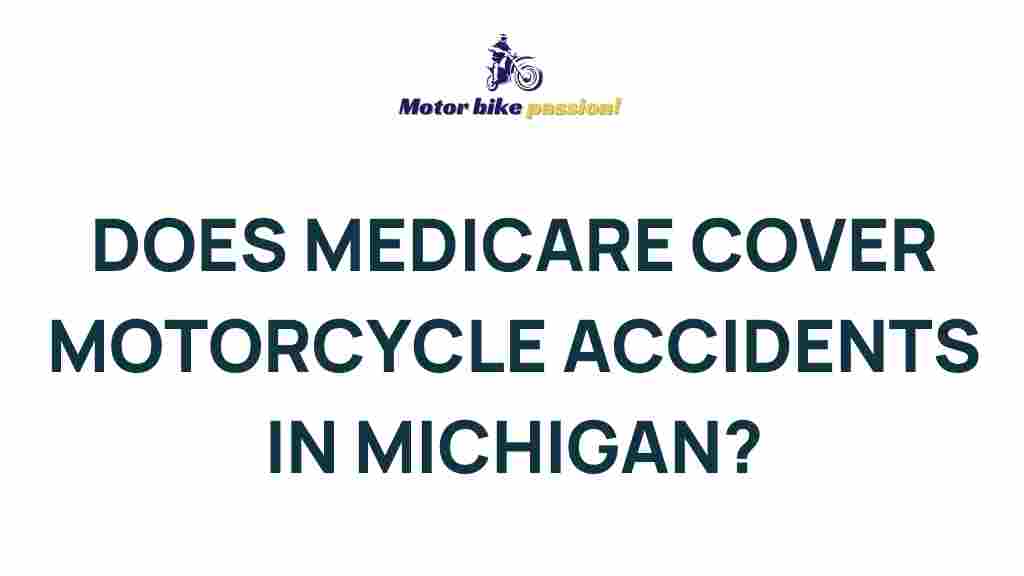Uncovering the Truth: Does Medicare Cover Motorcycle Accidents in Michigan?
Motorcycle accidents can lead to severe injuries and significant healthcare costs. For many, understanding how insurance works, especially Medicare, is crucial in managing these expenses. In Michigan, motorcycle riders often wonder whether their Medicare coverage extends to accidents that occur while riding. This article aims to clarify the connection between Medicare, motorcycle accidents, and healthcare coverage, providing insights into eligibility, benefits, and reimbursement processes.
Understanding Medicare and Its Coverage
Medicare is a federal health insurance program primarily for individuals aged 65 and older, as well as certain younger people with disabilities. It consists of different parts that cover various healthcare services:
- Part A: Hospital insurance that covers inpatient hospital stays, skilled nursing facility care, hospice, and some home health care.
- Part B: Medical insurance that covers outpatient care, preventive services, and some home health care.
- Part C: Medicare Advantage Plans that provide all Part A and Part B benefits, often including additional coverage such as vision and dental.
- Part D: Prescription drug coverage to help cover the cost of medications.
For individuals involved in motorcycle accidents, understanding which part of Medicare may apply is essential for accessing healthcare services.
Does Medicare Cover Motorcycle Accidents?
The short answer is that Medicare can cover healthcare services resulting from motorcycle accidents, but there are specific conditions and limitations. Here’s how it works:
Eligibility for Coverage
To be eligible for Medicare coverage, individuals must meet certain criteria, including:
- Being 65 years or older, or
- Having a qualifying disability, or
- Having End-Stage Renal Disease (ESRD) or Amyotrophic Lateral Sclerosis (ALS).
If you meet these criteria, you are eligible for Medicare, which may cover treatments related to injuries sustained in a motorcycle accident.
Types of Coverage Available
Medicare coverage for motorcycle accident injuries can be divided into two main parts:
- Medicare Part A: If you are hospitalized due to an accident, Medicare Part A can cover your inpatient hospital stay, including room and board, nursing care, and other services provided during your stay.
- Medicare Part B: This part can cover outpatient services, such as doctor visits, diagnostic tests, physical therapy, and necessary medical supplies after the accident.
However, keep in mind that Medicare has deductibles and copayments, meaning you may still have some out-of-pocket costs.
Filing for Coverage and Reimbursement
After a motorcycle accident, navigating the healthcare reimbursement process can be daunting. Here’s a step-by-step guide to help you through it:
Step 1: Seek Immediate Medical Attention
Your health should be your top priority. After a motorcycle accident, ensure you receive immediate medical care. This is important not only for your well-being but also for documenting the injuries for insurance purposes.
Step 2: Document Your Injuries and Treatments
Keep detailed records of your injuries, treatments received, and any medical professionals you consulted. This documentation will be crucial when filing for coverage.
Step 3: Check Your Medicare Coverage
Review your Medicare plan to understand what services are covered. Check if you have Medicare Part A and Part B, as these parts will primarily cover your hospital and outpatient care.
Step 4: File for Medicare Coverage
When you receive medical treatment, your healthcare provider will typically bill Medicare directly. However, you may need to provide additional information or documentation. Here’s what you need to do:
- Ensure your healthcare provider accepts Medicare assignments.
- Provide your Medicare number and any other necessary information to the provider.
- Keep copies of all correspondence and billing statements.
Step 5: Understand the Reimbursement Process
If you pay for services upfront, you can file a claim for reimbursement. To do so:
- Fill out the Medicare claim form (CMS-1490S).
- Attach all relevant documentation, including bills and receipts.
- Submit the claim within one year of receiving the services.
Once the claim is processed, you will receive a notice detailing what Medicare will cover and what you may owe.
Challenges and Troubleshooting Tips
While Medicare can cover motorcycle accident-related injuries, challenges may arise during the claims process. Here are some common issues and tips on how to resolve them:
Issue 1: Denied Claims
If your claim is denied, review the Explanation of Benefits (EOB) provided by Medicare. It will outline the reasons for the denial. Common reasons include:
- Services not deemed medically necessary.
- Lack of documentation.
- Provider not enrolled in Medicare.
If you believe the denial is incorrect, you can appeal the decision. Follow the appeal process outlined in the EOB.
Issue 2: High Out-of-Pocket Costs
Medicare coverage may still leave you with significant out-of-pocket expenses. Consider the following options:
- Look into Medigap policies to help cover additional costs.
- Explore Medicare Advantage Plans that may offer broader coverage.
- Discuss payment plans with your healthcare providers.
Issue 3: Confusion About Coverage Limits
Many beneficiaries are unaware of their coverage limits under Medicare. To avoid surprises:
- Regularly review your Medicare plan details.
- Consult with a Medicare advisor for personalized guidance.
- Stay informed about any changes in Medicare policies or benefits.
Conclusion
In summary, Medicare can indeed cover healthcare services related to motorcycle accidents in Michigan, provided you meet the eligibility criteria and understand the coverage specifics. By following the necessary steps for filing claims and being proactive in resolving any issues, you can effectively navigate the complexities of Medicare coverage.
For more detailed information on Medicare benefits and coverage, visit the official Medicare website. If you need assistance with your Medicare plan or have specific questions about coverage for motorcycle accidents, consider reaching out to a healthcare professional or a Medicare advisor.
By being informed and prepared, you can ensure that you receive the healthcare benefits you deserve after a motorcycle accident, helping you focus on recovery rather than financial worries.
This article is in the category Safe Driving and created by MotorBikePassion Team
